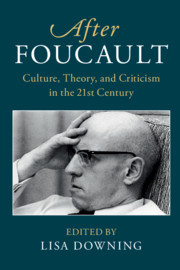Book contents
11 - Foucault and the Queer Pharmatopia
from Part III - Reading After Foucault
Published online by Cambridge University Press: 30 May 2018
Summary
Get a life you drug addicts!
Phlash! featuring Steve Hill, ‘Get a Life’Before – and after – the psy sciences confected the regulatory concept of ‘addiction’ for their police paymasters, ordinary people have sought out intoxication, sometimes by way of the psychoactive drugs which that concept has been used to prohibit. Critical scholarship on the discourse of addiction has been profoundly influenced by Michel Foucault's work and it has also long been known that Foucault took drugs, especially during what was arguably his most intellectually inventive period. This chapter looks again at Foucault's use of drugs – the kind of life and community he got from them – in conjunction with the powerful critique his work frames of the dominant securitarian consensus under neoliberalism today, according to which such unauthorized drug-use is inevitably addictive and pathological. The stimulant pre-text for this discussion is the auto/biographical portrait by Mathieu Lindon, Learning What Love Means (2011). At a discreet distance of some three decades, Lindon paints a rich picture of the six years of his mid-twenties spent ‘alongside Michel’, in the philosopher's entourage gravitating around his flat on Rue de Vaugirard, in the 15th arrondissement of Paris, not far from Montparnasse. During these last six years of Foucault's life (1978–84) Lindon shows the philosopher as a friend, mentor, benefactor, and queer father figure. The author is a prolific novelist, journalist, and son of Jérôme Lindon, director of the avant-garde press Les Éditions de Minuit. Much of the book is concerned with a reflective parsing and intertwining of these two paternal influences: the aloof biological father and the permissive queer father, although this exploration of queer kinship and the difficult relationships between gay men and their fathers is a dimension of the book I gladly leave to other readers. My focus instead is on the autonomous social structures of care and meaning-making elaborated in an environment in which the consumption of illegal drugs is more the norm than the exception: opium, LSD, and heroin are all taken in significant quantities, by Foucault as by his younger entourage. The reader who searches the book like a sniffer dog with an abacus will lay paws on references to at least twenty-four occasions on which one or more of these substances are used.
- Type
- Chapter
- Information
- After FoucaultCulture, Theory, and Criticism in the 21st Century, pp. 170 - 184Publisher: Cambridge University PressPrint publication year: 2018
- 2
- Cited by

